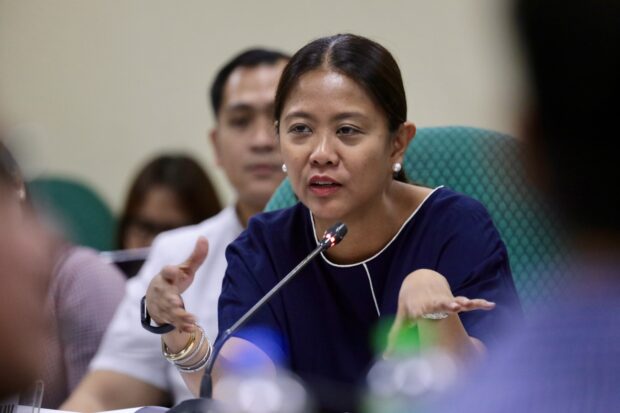
Sen. Nancy Binay (Voltaire Domingo and Joseph Vidal / Senate Social Media Unit)
MANILA, Philippines — Senator Nancy Binay on Sunday told Filipinos to manage their expectations on the effects of amending the 1987 Constitution as changing its economic provisions will not be a “magic solution” to the country’s problems.
In a statement, Binay said that if passed, the proposed changes to the principal Charter will not instantly solve economic woes including the high prices of goods in local markets.
READ: Charter framer Hilario Davide Jr. warns vs changing economic provisions
“Hindi ito magic solution na kapag napasa, mawawala na lahat ng problema natin o okay na ang ekonomiya ng ating bansa,” Binay was quoted as saying in a radio interview.
(This is not a magic solution that, once passed, will make all our problems disappear or fix our country’s economy.)
The legislator’s views stemmed from an OCTA survey conducted in December of last year which showed that the most pressing issue among Filipinos is the unabated rise in the prices of key goods.
According to her, improvements will take time even if the amendments were to push through.
“In the process we’re going to undertake, our fellow citizens might have false hopes. They might think that when they vote for the plebiscite, after one month, everything will be okay, rice prices will go down, or oil prices will go down, or our electricity problems will be fixed. But that’s not what’s going to happen.,” she added in a mix of Filipino and English.
She likewise said that Charter change (Cha-cha) is not the sole solution to the issues gripping the country.
The problems, Binay said, involve inconsistent policies which appear to change after every six years – when a new president is elected into office – therefore making it difficult for investors to predict the country’s business climate forcing them to refrain from making investments.
Listen to everyone
On February 5, a Senate subcommittee led by Senator Sonny Angara deliberated on the Resolution of Both Houses No. 6 which seeks to change three economic provisions in the Charter particularly on public utilities, education, and advertising.
READ: Senate deliberation on economic Cha-cha begins
During the hearing, several resource persons including former Supreme Court justices and framers of the 36-year-old Constitution opposed Cha-cha and stressed that the Charter is not the problem but instead its ill implementation.
Binay, in the same statement, stressed that it is important to listen to such perspectives prior to making a decision on the matter.
“As of the moment, for me, I think we should listen to everyone first before I make a decision. But so far, based on the initial hearing, it seems like we had more resource persons who emphasized that it’s not yet timely to change our Constitution,” she continued.
At the Senate hearing, Retired Supreme Court Chief Justice Hilario Davide Jr. cautioned that changing the Charter’s stipulations to be more accommodating to foreigners might make the country’s industries vulnerable to foreign control.
This, amid claims from some members of the House of Representatives who say that changing the “restrictive” economic provisions in the Constitution would attract more foreign direct investments which would fuel the country’s growth.

